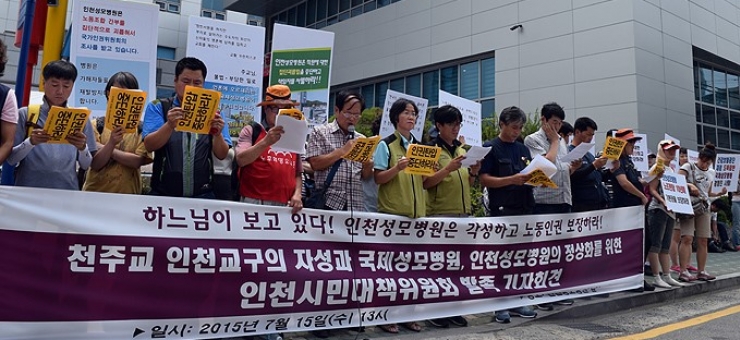'I stand up against injustice and violence' - the problem with Catholic University Incheon St. Mary’s Hospital in Seoul

Not for profit and charitable organisations with religious affiliation are increasingly providing health services around the world. But their non profit status may not always make a difference to the kind of cost cutting measures and low standards that are increasingly being seen in health systems in many countries. Declining standards undercut the care provided to the communities these facilities are supposed to support. Hand in hand with poor practices come a lack of transparency and anti union activity as unions often end up policing and publicising poor practices such as understaffing, intimidatory tactics, and more. One example of a catholic hospital with such a record is the Incheon St Mary's Hospital in Seoul. Read on to hear about the Korean Health Workers Union, (KHMU) and their efforts to repsond to the treatment of workers in the hospital.
'A panel of human rights lawyers, the representative of the Catholic Priests' Association for Justice (CPAJ), activists from civil society, and industrial relations experts convened a joint discussion forum about problems at the Catholic University Incheon St. Mary’s Hospital, in Seoul. Panelists critiqued the direction of the hospital, noting that since 2005 a relentless pursuit of profits over patient and staff needs has taken over the hospital.
Forum presentations exposed hospital management efforts to compel its medical professionals and other employees to work excessive overtime and overreach to make profits: management set a target for the number of patients and posted the current number and the target across the hospital computer system. At the direction of the hospital, employees circulated hospital flyers on the street to recruit more patients. They also ran a campaign to attract more outpatients, marking D-days to meet target numbers such as 2,000 Day and 3,000 Day and forcing doctors to pursue such profit making. This pressure led some doctors to resign. The hospital provides medical consultations to outpatients until as late as 10:00 pm. As a result of such long hours, nurses cannot even make time for lunch. A nurse who has been working for three months now said she did not even know where the hospital canteen was located, and some employees’ pay-slips contain no meal invoices for reimbursement.
Hospital management has disrupted legitimate union activities and forced union members to withdraw. As a result, union membership decreased by 120 in 2006 and today, only 11 employees remain in the union. In 2007, management questioned a matter that occurred two years before and took disciplinary action against 25 regular union members and 10 union executives. Even worse, they filed a claim against 20 union members for damages of KRW 1.18 billion and took an unnecessary action of provisional seizure of properties. Most actions were dismissed, yet union members suffered severe psychological pain for a couple of years while the trial proceeded.
In 2008, a small video camera, apparently for monitoring, was found around the union office. Management even obstructed the circulation of union leaflets, which is a violation of the freedom of expression. Wages have been frozen for four years in a row. A collective agreement was unilaterally nullified twice by management, and it was further revised to defeat the union’s goals. The branch leader of the union has been harassed and bullied by management on numerous occasions.
Furthermore, there are suggestions of corrupt practices with employees of International St. Mary’s Hospital was under police investigation for accusations that the hospital’s employees invited their friends and relatives to the hospital and registered them as patients to raise revenue and claim additional national health insurance benefits.
The KHMU President Yoo Ji-hyun stated, “Hospitals should serve to protect health and lives of people, not to make profits. Incheon St. Mary’s Hospital should stop profit-oriented management, labor union repression and human rights violations. It should be an example of a hospital where patients, employees and labor are all respected.”
The KHMU also suggested the creation of labor-management communication channels in the university hospital. Similarly, the KHMU proposed a taskforce that would be made up of labor, medical, religious, political and local communities to provide the greatest possible collective intelligence for productive problem solving.
The KHMU declared 2015 as a year of three faces of respect: respect to patients, employees and labor, running a campaign to create a warm environment in hospitals: free of abusive language and behavior.
To this end, throughout March and April, the union conducted site investigations in hospitals and listened to union members’ experiences in their workplaces. Hospitals should not allow abuse, violence, sexual harassment and bullying to occur with impunity. The group-harassment issue observed in Incheon St. Mary’s Hospital motivates us, the KHMU to strengthen our campaign to eliminate abuse, violence, sexual harassment and group harassment.'

